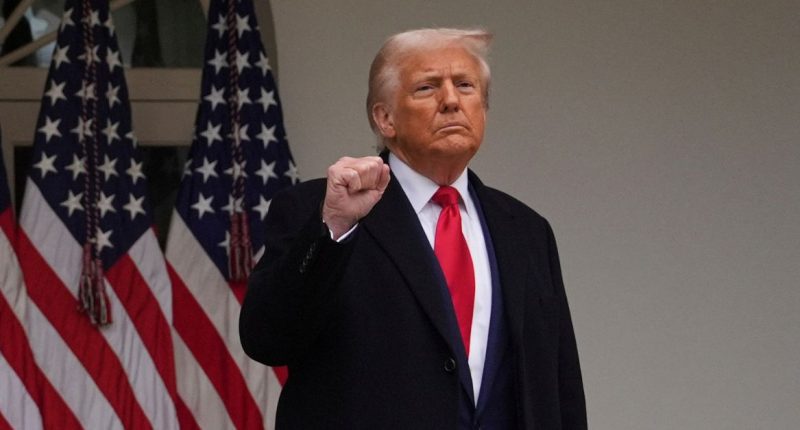Share this @internewscast.com
President Donald Trump is seen leaving after signing an executive order during an event in the Rose Garden at the White House, Wednesday, April 2, 2025, in Washington (AP Photo/Evan Vucci).
The U.S. Supreme Court on Monday delivered a significant win to the Trump administration in its quest to boost deportation numbers. The Court lifted an injunction from a lower court, permitting the government to revoke the legal protections of over 300,000 Venezuelan migrants, putting them at risk of immediate expulsion from the U.S.
The high court stayed a March 31 order by U.S. District Judge Edward Chen located in San Francisco. The order had previously blocked Homeland Security Secretary Kristi Noem from rescinding the “Temporary Protected Status” (TPS) granted by the Biden administration, which had been effective since 2021.
The justices voted 8-1 in favor of lifting the lower court’s stay, with only Justice Kentaji Brown Jackson, a Joe Biden appointee, noting that she would have outright denied the administration’s application.
The program is designed to allow migrants from countries that are deemed unsafe — typically due to significant violence or environmental disasters — to remain in the U.S. and work legally on a temporary basis.
In the district court’s initial order, Chen said that Venezuela was “so rife with economic and political upheaval and danger” that the State Department has categorized the it as a “Level 4: Do Not Travel” country due to the “high risk of wrongful detentions, terrorism, kidnapping, the arbitrary enforcement of local laws, crime, civil unrest, poor health infrastructure.”
Love true crime? Sign up for our newsletter, The Law&Crime Docket, to get the latest real-life crime stories delivered right to your inbox.
The judge said that Noem’s attempt to cancel the Venezuelan migrants’ legal protections — which took place just three days after she took office — appeared to be “predicated on negative stereotypes” that were casting “class-wide aspersions” on the character of Venezuelans.
After multiple court filings, Chen halted Noem’s measure, reasoning that her “unprecedented action” threatened to “inflict irreparable harm on hundreds of thousands of persons whose lives, families, and livelihoods will be severely disrupted, cost the United States billions in economic activity, and injure public health and safety in communities throughout the United States.”
“At the same time, the government has failed to identify any real countervailing harm in continuing TPS for Venezuelan beneficiaries,” the Barack Obama appointee wrote in a 76-page order. “Plaintiffs have also shown they will likely succeed in demonstrating that the actions taken by the Secretary are unauthorized by law, arbitrary and capricious, and motivated by unconstitutional animus. For these reasons, the Court grants Plaintiffs’ request to postpone the challenged actions pending final adjudication of the merits of this case.”
In its petition to the Supreme Court, the Trump administration asserted that the TPS program implicated the executive branch’s “particularly discretionary, sensitive, and foreign-policy laden judgments” in regard to immigration policy, effectively giving executive branch officials near-unilateral control over decisions regarding TPS.
“When the Secretary determines that a country no longer meets the conditions for designation, the statute requires her to terminate the TPS designation — as Secretaries have periodically done across administrations,” Solicitor General John Sauer wrote in the administration’s emergency appeal. “To protect the Secretary’s wide discretion in this fast-moving area of foreign affairs, Congress shielded those determinations from judicial review: ‘There is no judicial review of any determination of the [Secretary] with respect to the designation, or termination or extension of a designation, of a foreign state.””
Attorneys for the Venezuelan migrants pleaded with the justices to keep their clients’ protected status intact, arguing that Noem was not authorized to vacate the previous administration’s TPS extension.
“Staying the district court’s order would cause far more harm than it would stop,” the attorneys wrote. “It would radically shift the status quo, stripping plaintiffs of their legal status and requiring them to return to a country the State Department still deems too dangerous even to visit.”














